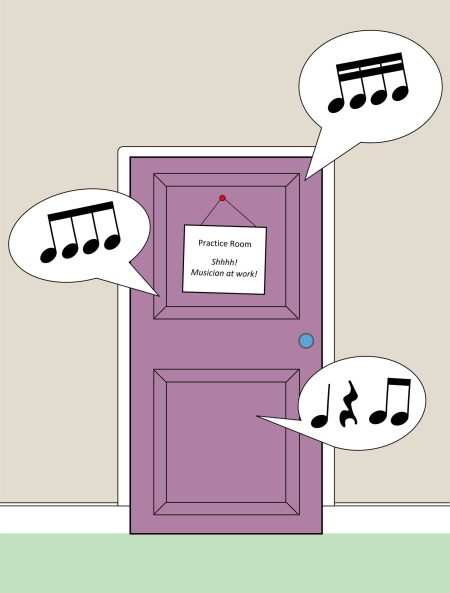Practising Mistakes

Practising: What can you do to improve your practice sessions and so improve your playing more quickly?
Distractions – switch off your mobile (or at least put it on silent). Avoid practising when the TV / computer etc are on in the same room or where other people may be walking in and out. Preferably practise somewhere where and when you are not likely to be disturbed or interrupted.
If you’re practising the piano, before you start check that the stool is at the right height for you – you will make practising more difficult for yourself if you are sitting at the wrong height or the stool is the wrong distance from the piano.
Similarly, if you have a music stand, check that it is at the right height for you – make sure you don’t bend over to play because if the stand is too low it will affect your breathing, tone etc.
If the musician is a small child whose feet don’t reach the floor, find a solid box to put underneath their feet so that their weight is on the floor not on their hands and arms.
Follow your teacher’s instructions – if your teacher has written notes into a notebook for you or onto your score then read them and do what they say – they are there to help you to improve your playing (it’s amazing how many pupils don’t do this).
At the start of your practice session, identify the the most difficult sections of your music and work on those first. Don’t automatically go back to the beginning every time.
Play ‘Spot The Difference‘ – compare what you hear when you play with what the composer says. As soon as you notice a difference, stop, and just practise that tiny section. Make sure you play that section correctly many more times than incorrectly otherwise the incorrect version will stick.
Don’t keep going back to the beginning and don’t just play from start to finish without stopping to correct errors (doesn’t apply to sight-reading or when you are doing a dummy run prior to a performance).
Look at the score (your music) when you are practising, as much as you can. If you only look at your hands and keyboard or you look out of the window etc and not at the score, you are practising from memory thereby simply practising mistakes ie. repeating and reinforcing them.
If you have a choice of fingerings then do the same fingerings for the same passage every time. (Wind instruments, for example, usually use the same combination of fingers for the same note whereas on the piano, any finger and thumb can be required to play any note.)
Be honest with yourself – don’t say to yourself that something sounds O.K. when it doesn’t. If you find yourself thinking “I’ll fix that bit tomorrow” then fix it today – don’t keep putting off working on the difficult bits.
Practise at a sensible speed. Don’t try to speed up a passage until you can play it slowly and under control.
Think it through in your imagination first: if you can imagine yourself playing what the composer says – notes, rhythm, fingering, pedalling etc there’s a better chance that you’ll be able to play it for real.
Take the music apart into small, manageable sections. Practising big sections, at least in the initial stages, means that there’s too much to think about all at the same time which makes it easy to forget what you need to do to improve, like somebody taking too big a bite of food and then finding it difficult to chew because there’s too much in their mouth.
Several short practice sessions through the week are more beneficial than one long session once a week.
It can be helpful to set a regular time of day to practise so that it becomes part of your daily routine.
If you find yourself thinking “I can’t” then try anyway – you might surprise yourself.
If you don’t understand something, then ask your teacher (if you have one) or find out.
The biggest mistake of all? Not doing any practice or doing almost none. It takes a lot of time, patience and commitment to learn an instrument; no practise means no progress which means you keep making the same mistakes which means that the pupil, or parent, is paying the teacher to tell the pupil the same things over and over again at every lesson which can be very frustrating for both.
(If you’re in another country, here in the U.K. we use ‘practise’ as a verb and ‘practice’ as a noun (like ‘advise’ and ‘advice’))